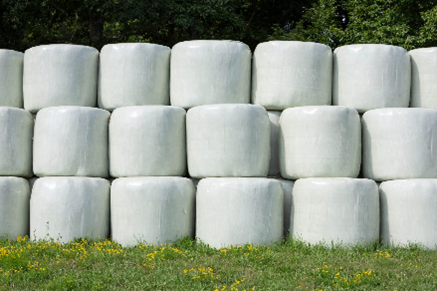
Bale Wrap Wanted for Recycling Program
By Michael Snow, Connecticut River Watershed Farmers Alliance
"Give us your used, tired plastic;
your huddled masses of bale wrap yearning to be recycled.
The wretched refuse of your ensiled hay.
Send these, the homeless, tempest-tost to me,
I lift my bin dumper unto the compactor's golden door."
Poem by Guy Crosby’s great-great-grandfather - said to be seen at the base of the Statue of Liberty Hill Farm in Rochester, VT
Used bale wrap piling up? The Connecticut River Watershed Farmers Alliance (CRWFA) has a new recycling program to help farmers in Vermont and New Hampshire turn agricultural plastic waste into something useful.
Many of us use plastic on the farm – to cover bunks and ensile feed, to move sap through the sugarbush, cover high tunnels and greenhouses, to mulch the ground and irrigate high value crops, et cetera. For better or worse, plastic can improve farm economics, reduce silage leachate, and help us deal with changing weather patterns. Many of us might have a hard time running our farms without it.
A drawback to using agricultural plastics; we have to dispose of it. Recycling those plastics is challenging. They are difficult to keep clean and store due to their use and bulk. They are not included in state recycling programs in either Vermont or New Hampshire. Very few recycling markets exist for them, and those that do pay very little. Instead, most of us take our plastic to the landfill, where tipping fees are among the highest in the country. There aren't many good options.
CRWFA has started collecting used bale wrap to take to a recycling plant out of state. Guy Crosby (Clay Hill Farm and CRWFA board member) and Annie Macmillan are leading the effort. "We want this to be a reliable, economical, and farm-led recycling program," they said.
For the time being, the program is a pilot for Connecticut River basin farmers and is taking bale wrap only: no nylon net wrap, bunk plastic, or horticultural plastics. As the group works out logistical details, it hopes to expand collection to other parts of the state, or to collaborate with other groups to do so. It is also exploring markets for other plastics.
Participating farmers are asked to share responsibility for sending reasonably clean plastic to recyclers out of state. According to the organizers: "We're only taking bale wrap at this time. And it needs to be clean to take to the recyclers. Some bale juice is okay, but we can't send gravel, mud, water or ice to them. If the wrap is too dirty, they might refuse it or pay us less, which will make it more difficult to cover our transportation costs."
CRWFA is asking each farm to join the organization, a $50 membership. That money will help cover costs related to collection and organization. From there the process is simple:
- CRWFA will deliver totes (super sacks) to your farm.
- You fill them with clean, dry bale wrap—no gravel, dirt, manure, or ice allowed.
- Contact CRWFA when your totes are full, and we will pick them up and leave fresh ones.
Then plastic will be compacted and stored until delivery to Pennsylvania, the expected market.
For farms that use large amounts of bale wrap and find totes inconvenient, the program can work with you to find an alternative solution.
The group is working with more than twenty farms heading into the new year and looking for more interested farmers. If you are interested, come to our Annual Meeting, which is 10am-2pm on Wednesday, January 15th at Billings Farm in Woodstock, Vermont. You can also get in touch with CRWFA through our website, by email, or phone.
To sign up for the program or learn more, you can:
- Attend the CRWFA Annual Meeting on January 15 at Billings Farm in Woodstock, VT
- Fill out the Bale Wrap Recycling Form, found at https://www.crwfa.org/ag-plastics
- Email crwfa.info@gmail.com
- Call CRWFA at (802) 345-9201

